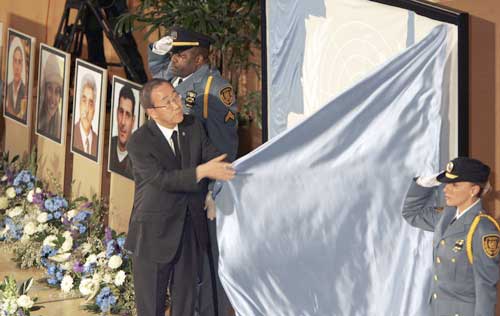
UN staff pay for the sins of big powers
NEW YORK - When the UN offices in Algeria were bombed last month, the hidden fury of the terrorist group responsible for the attack may have been indirectly aimed at the Security Council or at the Organization as a political body. But the 17 staff members who were killed in that attack -- and who were working mostly for humanitarian and development-oriented agencies -- probably died in vain because they were professionally divorced from the insidious politics of the UN or its Security Council. Dominated by the five big powers-- the US, UK, France, China and Russia -- the 15-member Security Council has continued to be manipulated to promote hidden agendas -- whether imposing sanctions against Iraq and Iran, or passing strictures against Sudan, Syria and Somalia. Or protecting Israel from sanctions and condemnations despite its continued brutalities in the occupied territories. Notwithstanding worldwide condemnation of the humanitarian crisis in Gaza triggered by the Israelis last week, the Security Council was nowhere close to adopting a resolution condemning Israel primarily because of the threat of a veto by the US -- backed by France and Britain. But Al-Qaeda, which has trained its guns on the UN, is deliberately or mistakenly firing at the wrong targets. The threats against UN staffers have been directed, not at the powerbrokers and decision-makers in New York, but at UN officials and peacekeepers in countries such as Iraq, Sudan, Somalia, Afghanistan and Lebanon. Osama bin Laden, described as the mastermind behind the terror attacks on the US in September 2001, offered a reward of some 10,000 grams of gold for the lives of former Secretary-General Kofi Annan and his Special Representative in Afghanistan Lakhdar Brahimi. But both were creatures of the 192 member states -- and did what they did at the bidding of the member states, specifically the five big powers in the Security Council. As a senior UN official explains: "the United Nations means many things to many people." First, there is the political body, and then there is the Secretariat, and the various humanitarian agencies. If the Security Council is accused of double standards or being biased, he says, it's the big powers that are to be blamed-- not the UN staff in the Secretariat or in the field. "Unfortunately, most people out there have failed to make the distinction between the United Nations as a political animal and the United Nations as a humanitarian organisation," he added. Ban Ki-moon’s response So, if a UN office is targeted, it's the staff that takes a beating, not member states, which trigger the political resentment, in the first place. Asked about the attacks, Ban Ki-moon told reporters last week: "As the Secretary-General, I feel it very unfortunate and sad that the United Nations has become the target of terrorist bombings, already for the second time, after the terrorist bombing which happened four years ago in Baghdad." "There may be many areas strategically where we will have to look at this issue," he said, expressing customary reticence in divulging some of the new security measures the UN plans to take. Primarily, he said, the responsibility of protecting UN staff and premises falls on the host government. "And we do expect that the host governments, wherever the United Nations operates, should provide adequate and necessary protection and facilities and measures. This is what I am going to discuss with (the U.N.'s 192) member states," said Ban. Kemal Dervis, head of the UN Development Programme (UNDP), whose office was destroyed in the Algiers attack, says the situation is so bad, that in at least six countries, the UN staff has been told to work at home because some of the UN agencies in the field have become more "explicit targets" of terrorist groups. Dervis refused to identify the six countries, but admitted Algeria was one of them. He said victims in the Algerian attack were not soldiers who signed up for battle, "but people, mostly Algerians, who are working for peace, development and to alleviate human suffering." "It's so saddening for me to see, with my own eyes, the impact of this attack on colleagues so committed to helping create sustainable livelihoods for Algeria's poor, supporting access to justice, strengthening the national parliament and promoting environmental protection," said Dervis, one of the most senior UN officials to visit the scene of the attack last month. With the UN increasingly becoming a target around the world, the Staff Union has called for the strengthening of security measures system-wide, and also demanded an independent investigation into the attack in Algeria. But last week the Secretariat was involved in a war of words with the Algerian government which is opposed -- primarily for political reasons -- to any independent investigation of the bombing. |
|
||||||
|| Front
Page | News | Editorial | Columns | Sports | Plus | Financial
Times | International | Mirror | TV
Times | Funday
Times || |
| |
Reproduction of articles permitted when used without any alterations to contents and the source. |
© Copyright
2008 | Wijeya
Newspapers Ltd.Colombo. Sri Lanka. All Rights Reserved. |
